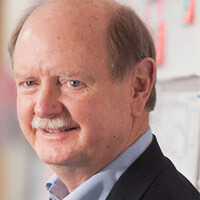RICHARD MILLER

September 2009
What Does Every Engineer Need to Know--Now?
BIOGRAPHY:
Richard K. Miller was appointed president and first employee of the Franklin W. Olin College of Engineering on February 1, 1999, where he also holds an appointment as professor of mechanical engineering. Before joining Olin College, he served as Dean of Engineering at the University of Iowa from 1992-99. He spent the previous 17 years on the engineering faculties at the University of Southern California (where he held the position of Associate Dean for Academic Affairs) and the University of California, Santa Barbara. Miller has authored or co-authored about 100 technical publications in the field of applied mechanics, and has won five awards for teaching excellence. He is a member of the governance boards for two independent colleges and The Stanley Group, an international engineering services company. He has served as Chair of the NSF Engineering Advisory Committee, chair of the Association of Independent Technological Universities, a member of the Visiting Committee for the School of Engineering and Applied Sciences at Harvard University, chair of the accreditation visiting committees of several independent institutions, a member of the Higher Education Working Group of the Council on Foreign Relations, and is a consultant to the World Bank in forming new universities in developing countries.
He earned his B.S. degree in Aerospace Engineering from the University of California, Davis in 1971, where he is the recipient of the 2002 Distinguished Engineering Alumnus Award. He received an S.M. in Mechanical Engineering from MIT in 1972, and a Ph.D. in Applied Mechanics from Caltech in 1976.
ABSTRACT:
As we engage the grand challenges of the 21st century, the role of engineering is increasingly entangled in a rapidly evolving global context of economic, social, and political issues. The solutions to the global challenges we face must transcend time zones and political boundaries and require interdisciplinary approaches as well as international cooperation. While science and engineering will remain central to many of these challenges, science and engineering alone will not provide solutions to any of them. Technology has become an amplifier on human intentions: in each generation, technology enables a smaller and smaller number of people to influence the lives of an increasing number of others--either for the better or the worse.
Unintended consequences can no longer be ignored. These immense challenges are likely to require decades to solve. They are fundamentally the challenges of the next generation. In this context, what will every engineer of the next generation need to know? And what should the role of engineering be in addressing these challenges? The life's work of Dr. Rechtin may provide some insight into these important questions.
Published on March 27th, 2017
Last updated on December 16th, 2019

